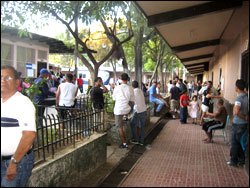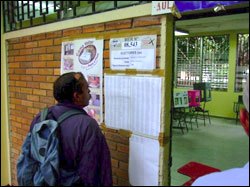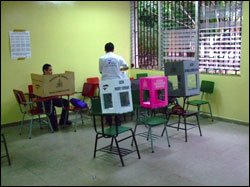Honduran Elections a Beacon of Democracy in Region Threatened By Venezuelan Leader’s Socialist Revolution
By Jim Colbert
By Jim Colbert
On November 28, Honduran voters overwhelmingly turned out to elect their country’s next leader defying boycott calls by ousted President Manuel “Mel” Zelaya and threats of violence by his supporters. Reports from the thousands of national observers and nearly 500 international observers confirmed that the election was, by all standards, free, fair and open. In the end, the National Party presidential candidate, Porfirio “Pepe” Lobo, won a decisive victory over his main rival, Elvin Santos of the Liberal Party.
free, fair and open. In the end, the National Party presidential candidate, Porfirio “Pepe” Lobo, won a decisive victory over his main rival, Elvin Santos of the Liberal Party.
Observers reported no major disruptions on Election Day. A small group of Zelaya supporters briefly staged a street protest in the northern city of San Pedro Sula and it was reported that several roads were blocked for a few hours in the south of the country. Polling stations there stayed open longer to accommodate those delayed.
Lobo’s margin of victory over Santos was a decisive 16 percent. At the scene of his concession speech, Santos told the media that, “In a free and sovereign election, the Hondurans chose to elect Porfirio Lobo Sosa as the next president of the republic. We must accept their will.”
In 2005, Zelaya’s Liberal Party victory eked out a 3.7 percent margin of victory over Porfirio Lobo that was not without controversy as the National Party formally disputed the results and requested a recount. Turnout for the 2009 elections exceeded the last election in 2005 that brought Zelaya to power.
The successful election can be seen as a complete refutation of Venezuelan strongman Hugo Chávez’s desire to see Zelaya extend his term in office indefinitely, as Chávez has done in Venezuela. Using his country’s vast oil revenues, Chávez has been heavily funding the export of his self-styled “Bolivarian Revolution” in Honduras, Nicaragua, Bolivia and Ecuador. Furthermore, the Honduran elections were a set back for the secretary general of the Organization of American States, Jose Miguel Insulza, who refused to send election observers, but had pledged earlier to send observers to oversee Zelaya’s illegal referendum that precipitated the crisis.
Domestic and International Election Observers
I served as an international observer of the elections, which also included ballots for National Congress members and city mayors. My participation, alongside nearly 500 other international observers from 31 countries, was the result of an invitation extended by the Honduran Supreme Electoral Tribunal (TSE), the independent government agency that runs the Honduran electoral system. The Civil Democratic Union (UDC), a non-partisan, independent domestic organization committed to strengthening Honduran civil society, submitted my name to the TSE.
(UDC), a non-partisan, independent domestic organization committed to strengthening Honduran civil society, submitted my name to the TSE.
The TSE is headed by a team of magistrates representative of the major political parties who are voted on by the National Congress. The TSE is separate from the legislative, judicial, and executive branches of government. Owing to its past experience with military coups and political leaders using the military to further their own ends, the Honduran constitution mandates that control of the military switches to the TSE from the executive branch 30 days prior to elections.
Prior to the Election Day, I joined my counterparts for briefings and seminars put on by the TSE covering the rights and responsibilities of international observers and Honduran election law. I also participated in a meeting with U.S. Ambassador Hugo Llorens intended to elucidate the U.S. government’s position on the elections and the future status of former President Zelaya.
On November 29, I visited nine separate polling centers in neighborhoods ranging from upper middle class to desperately poor all within the greater urban sprawl of Tegucigalpa, Honduras’ capital and largest city with a population of 2.2 million. The polling places contained six to 17 voting stations. At each polling center my counterparts and I spoke with TSE workers at each voting station, with voters and with the police and soldiers providing security.
Voters were overwhelmingly excited to exercise their right to vote. Many spontaneously told me that they resented Venezuela’s interference in their country and were pleased to see observers from other countries. It was an experience shared by many other international observers with whom I later spoke. Reported problems were limited to small numbers of polling centers opening late and a few incidents where polling station materials kits were incomplete. Replacement supplies were located in a timely fashion and all TSE voting center representatives had been given the authority to keep the polls open an extra hour.
Replacement supplies were located in a timely fashion and all TSE voting center representatives had been given the authority to keep the polls open an extra hour.
The June 28 Crisis
Planning for the elections, primaries for which were held in November 2008, predate the crisis of June 28, 2009 that saw then-President Zelaya ousted from office when the state attorney general charged him with seeking to violate the country’s constitutional limit on the president serving no more than a single term. Zelaya was just about to roll out a national referendum that would have presented the country with a vote to establish a National Constituent Assembly on the question of amending the constitution to remove the term limit.
Article 239 of the Honduran Constitution states that one who served as president cannot be a candidate for president again. The same article also states that public officials who breach this article, as well as those that help them, directly or indirectly, will automatically lose their immunity and are subject to prosecution. The Court ruled that Zelaya’s actions fell under the scope of these articles and determined that Zelaya, a Liberal Party leader, must face trial. Zelaya was defiant in the face of the Court’s ruling. In response, the chiefs of the Honduran military resigned in protest. The next day, after an appeal from the Court, the military leaders agreed to return to their offices.
In a majority vote, the Liberal Party-dominated Honduran National Congress agreed with the Supreme Court. On the eve of the referendum being put into action, Zelaya was arrested by Honduran Army troops, acting under direct orders from the Court. In a controversial move, Zelaya was put on a plane and sent to exile in Costa Rica. He was replaced by the then-president of the National Congress, Roberto Micheletti, also a Liberal Party member.
The situation was further complicated when Zelaya managed to slip back into Honduras on September 20, 2009 and took up residence in the Brazilian embassy in Tegucigalpa where he issued calls for a boycott of the elections.
Upon Zelaya’s removal from office, Micheletti became interim-president of the country and announced that he would not run in the elections that would take place four months hence. Constitutional laws mandated that Micheletti, as the head of the National Congress, become the provisional head of state because Zelaya’s vice president, Elvin Santos, had resigned in December 2008 to pursue his own run for the presidency.
Micheletti’s term ends on January 27, 2010 when President-elect Lobo is sworn in. The controversy did not end with the election, however. Those countries that denounced the election wanted to see Zelaya restored to office until Lobo’s swearing in.
 On Wednesday December 3, an overwhelming majority of the Honduran Congress voted to not reinstate Zelaya as head of state. In a process that lasted many hours, 111 lawmakers of the 128-member body voted in favor of a motion not to return Zelaya to office.
On Wednesday December 3, an overwhelming majority of the Honduran Congress voted to not reinstate Zelaya as head of state. In a process that lasted many hours, 111 lawmakers of the 128-member body voted in favor of a motion not to return Zelaya to office.
Despite the legality under Honduran law of Zelaya’s removal from power, the elections were condemned by many countries and were boycotted by the Organization of the American States, the United Nations, the European Union as well as neighboring democratic powers Brazil and Argentina.
The TSE began setting up the elections in May 2008 with primaries held in November of that year to determine the presidential, congressional, and mayoral candidates. Approximately 120 International Observers monitored the 2005 elections. International Observers came from all over the world with large contingents from neighboring countries such as Nicaragua, Bolivia, Costa Rica and Colombia. I personally made the acquaintance of observers from Spain, Sweden, Mexico and Japan as well as many members of the U.S. delegation. Domestic and International Observer contingents were bolstered by the presence of teams from the independent election monitoring groups, the National Democratic Institute and the International Republican Institute.
The Changing U.S. Position
Concluding that Zelaya’s ouster constituted a coup d’etat, the State Department imposed sanctions including a suspension of desperately needed development aid, pulled Honduran officials’ visas preventing them from coming to Washington for discussions over the crisis and curtailed training and assistance to the Honduran military. The latter was a curious reaction considering that senior U.S. officials had praised the Honduran military for its dramatic evolution since the early 1980s into an apolitical body that surveys have shown to be the most respected institution in Honduras.
In the wake of the election, however, Foggy Bottom’s hard line may be softening. The day after the election, Arturo Valenzuela, the Assistant Secretary of State for Western Hemisphere Affairs said that, “The United States takes note of the election. We see that Lobo was the frontrunner, that he won the election. We commend him for that. He will be the next president of Honduras.”
 The new U.S. position is that a national unity government must be formed to lead the country through to the January 27, 2010 changeover and a truth commission be established to thoroughly investigate the incidents leading up to the events of June 28. Micheletti has indicated he will step aside in favor of a unity government.
The new U.S. position is that a national unity government must be formed to lead the country through to the January 27, 2010 changeover and a truth commission be established to thoroughly investigate the incidents leading up to the events of June 28. Micheletti has indicated he will step aside in favor of a unity government.
Calls for Zelaya’s return to power, a key component of the Organization of American States (OAS)-brokered San Jose-Tegucigalpa Accord of October 30, 2009 signed by representatives of both the Micheletti and Zelaya camps, have weakened especially considering that Zelaya himself announced over the weekend of the election that he no longer desired to return to office.
Despite the OAS rejection of the Honduran interim government and the election itself, Valenzuela noted that “[W]e recognize those results…” Since the United States is a leading member of the OAS, Valenzuela told reporters that both he and Secretary of State Clinton had spoken with the heads of the OAS states including Guatemala, El Salvador, Costa Rica, Peru, Uruguay and Colombia. It appears the U.S. is seeking a plan to bring Honduras back into the OAS fold.
The toughest nuts to crack appear to be Argentina and Brazil. Venezuela can be expected to continue to oppose Honduras no matter what happens, since Zelaya’s removal from office is seen as a setback for Hugo Chávez’s “Bolivarian Revolution.” Chávez had been flooding Honduras with money to back Zelaya’s power grab. Several Honduran voters approached me during the day to say that the elections were about more than democracy, that they were a statement of Honduran independence and that they would not allow Venezuela to interfere with their sovereignty.
It appears too that Germany, Japan, France, the Czech Republic, and Poland will also recognize the elections to be joined over time by Spain, Russia and China. As one International Observer, former Bolivian President Jorge Quiroga noted, those who don’t accept the elections “are asking for the creation of a huge democratic vacuum because come January, this country will have no president, no congress and no mayors.”
–Jim Colbert is JINSA’s Communications Director as well as Managing Editor of the organization’s Journal of International Security Affairs.